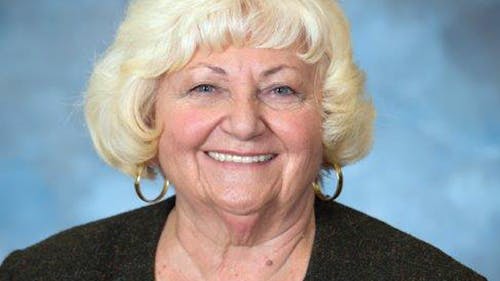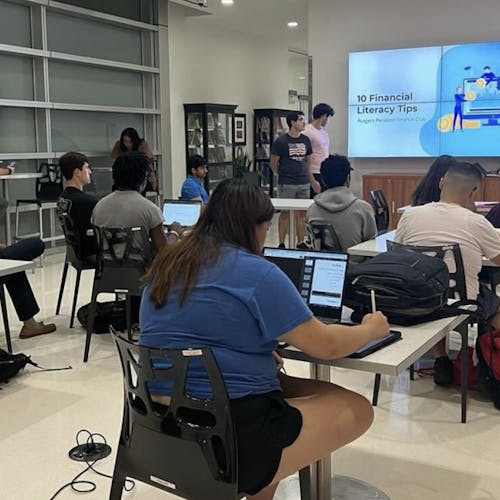Rutgers midwife wins humanism in healthcare award at 77

Elaine Diegmann appreciates simple pleasures an average 77-year-old woman would enjoy, such as collecting antique dolls, gardening and watching ocean waves meet the shore. However, she still sees no end to her expansive midwifery career — or at least avoids the thought of retirement.
Diegmann, director of the Nurse Midwifery Program at Rutgers, has recently earned the Lester Z. Lieberman Humanism in Healthcare Award, which is given to individuals for “treating patients and their families with exceptional kindness, compassion, and respect,” according to the School of Nursing website.
“This is a very special award because it rewards me for what I love doing best and that’s being with mothers and babies and families during the birth process,” Diegmann said.
For more than 50 years, Diegmann has cared for women and their infants since graduating from the University of Pennsylvania School of Nursing. After graduating in 1959, she attended the College of Medicine and Dentistry of New Jersey, according to a Rutgers Today article.
“I have the distinction, as far as I know — no one has challenged me on this — as being the oldest practicing midwife in the United States still attending births,” Diegmann said
Before she received her nursing degree, Diegmann set out to become a physician. Claiming she was “tired” of being encouraged to conform to common gender roles at the time, she changed her major to nursing
“There was a lot of controversy about women [becoming physicians],” she said. “I kind of got tired of being told that I really shouldn’t be taking the place of a man, and so I changed my major to nursing.”
During her first clinical rotation, she saw her first birth and knew that she wanted to work in labor and delivery, Diegmann said.
She said the high point of her career was when she delivered her own grandsons.
“They’re now 11 and 9 [years old], and that was really a highlight of my life — to receive them,” she said. “My eyes the first to see, and my arms the first to hold.”
Throughout her time as a nurse midwife, Diegmann said she witnessed the “medicalization” of birth in the United States. She said this process involves technology and intervention, which have replaced simply watching a woman progress through labor.
As a result, Diegmann said “medicalization” created the impression that pregnancy is a disease rather than a normal, physiologic process.
Diegmann said procedures, such as vaginal exams, rupturing of membranes and caesarean sections, were not performed routinely when she first became a nurse. She said the C-section rate, which was 3 percent when she first started, has grown to 50 percent in some hospitals.
“We interfere much more with births than other nations, and yet we stand like 40th or 43rd in industrialized nations in infant and maternal morbidity and mortality,” Diegmann said. “We’re not doing any better because we interfere so much.”
Midwife-led deliveries have better outcomes for mothers and infants because they are reluctant to intervene with the birthing process unless absolutely necessary, Diegmann said.
The Centers for Disease Control and Prevention, the World Health Organization and the National Institute of Health, among others, identified six characteristics of normal physiologic birth processes that should be supported by caregivers, she said.
According to a statement published by the American College of Nurse-Midwives, the Midwives Alliance of North America and the National Association of Certified Professional Midwives, normal childbirths include spontaneous onset and progression of labor.
Moreover, the statement also cited biological conditions that promote effective labor, vaginal birth of the infant and placenta, physiologic blood loss, skin-to-skin contact and early initiation of breastfeeding as characteristics of normal childbirth.
“We can transplant hearts and lungs and kidneys, but so far, we haven’t been able to transplant a perineum or a uterus,” Diegmann said. “We have to make sure that they’re functioning for the lifetime of the woman.”
Diegmann is renowned for her clinical expertise in soft tissue repair of episiotomies, which are surgical incisions made into the perineum, the area between the rectal and vaginal opening, to widen the opening for the infant’s head. She said tears heal more comfortably when they occur spontaneously rather than being artificially cut.
She also said artificial incisions could predispose the laboring woman to fourth degree episiotomies, in which the incision extends down into the rectum, especially if it is done improperly. The care provider must disperse the head of the baby laterally, not downward, Diegmann said.
“You’ll find in hospitals in which midwives practice [that] there’s a whole difference in practice among the physicians and the residents,” Diegmann said. “Our episiotomy rate at Newark Beth Israel [Medical Center] is only about 6 percent, which is very, very low.”
Lynn McFarlane, director of Marketing and Communications for the Rutgers School of Nursing, said Diegmann has been instrumental in helping hospitals understand the need for midwife practices and letting women know their alternatives for childbearing support during birth.
“[Diegmann] has a passion for mothers and babies,” McFarlane said. “She’s active in supporting women who want natural childbirths even after caesarean sections, and she’s worked with hospitals throughout our area in helping them to become baby-friendly.”
An average week as director of the Nurse Midwifery Program includes interviewing, admitting, advising and teaching students as well as attending faculty meetings, Diegmann said.
She also attends conferences and meetings nationwide that lecture and advocate for midwifery practices, but her passion still lies in the delivery room.
“For me, every birth, every mother, every couple — they’re different,” she said. “They’re just exciting, and I just love to receive a baby in my arms.”



